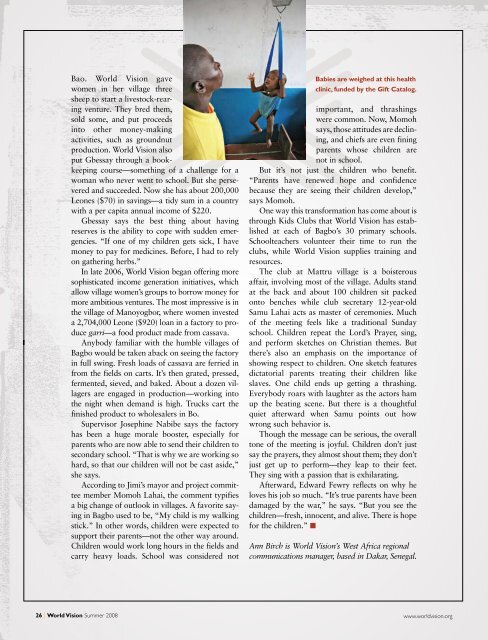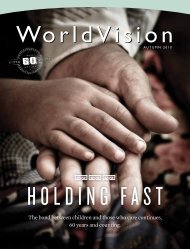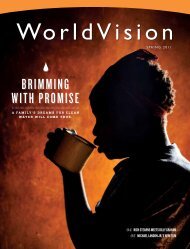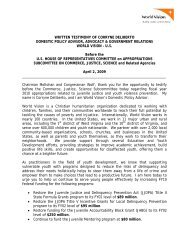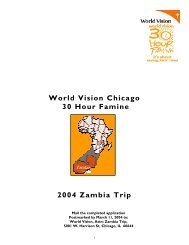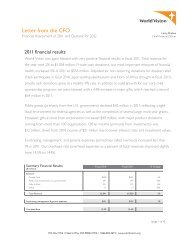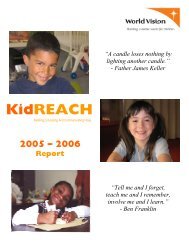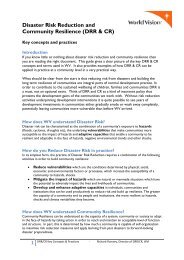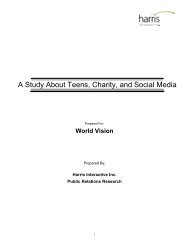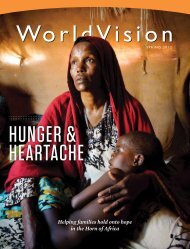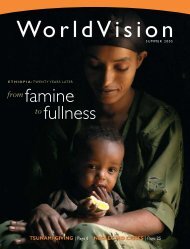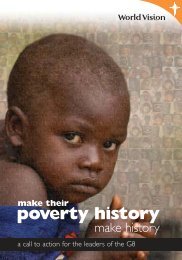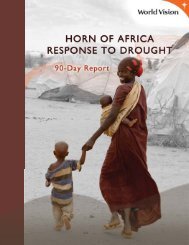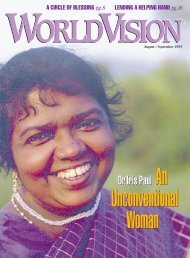Summer 2008: Inside a Sponsorship Community - World Vision
Summer 2008: Inside a Sponsorship Community - World Vision
Summer 2008: Inside a Sponsorship Community - World Vision
You also want an ePaper? Increase the reach of your titles
YUMPU automatically turns print PDFs into web optimized ePapers that Google loves.
Bao. <strong>World</strong> <strong>Vision</strong> gave<br />
women in her village three<br />
sheep to start a livestock-rearing<br />
venture. They bred them,<br />
sold some, and put proceeds<br />
into other money-making<br />
activities, such as groundnut<br />
production. <strong>World</strong> <strong>Vision</strong> also<br />
put Gbessay through a bookkeeping<br />
course—something of a challenge for a<br />
woman who never went to school. But she persevered<br />
and succeeded. Now she has about 200,000<br />
Leones ($70) in savings—a tidy sum in a country<br />
with a per capita annual income of $220.<br />
Gbessay says the best thing about having<br />
reserves is the ability to cope with sudden emergencies.<br />
“If one of my children gets sick, I have<br />
money to pay for medicines. Before, I had to rely<br />
on gathering herbs.”<br />
In late 2006, <strong>World</strong> <strong>Vision</strong> began offering more<br />
sophisticated income generation initiatives, which<br />
allow village women’s groups to borrow money for<br />
more ambitious ventures. The most impressive is in<br />
the village of Manoyogbor, where women invested<br />
a 2,704,000 Leone ($920) loan in a factory to produce<br />
garri—a food product made from cassava.<br />
Anybody familiar with the humble villages of<br />
Bagbo would be taken aback on seeing the factory<br />
in full swing. Fresh loads of cassava are ferried in<br />
from the fields on carts. It’s then grated, pressed,<br />
fermented, sieved, and baked. About a dozen villagers<br />
are engaged in production—working into<br />
the night when demand is high. Trucks cart the<br />
finished product to wholesalers in Bo.<br />
Supervisor Josephine Nabibe says the factory<br />
has been a huge morale booster, especially for<br />
parents who are now able to send their children to<br />
secondary school. “That is why we are working so<br />
hard, so that our children will not be cast aside,”<br />
she says.<br />
According to Jimi’s mayor and project committee<br />
member Momoh Lahai, the comment typifies<br />
a big change of outlook in villages. A favorite saying<br />
in Bagbo used to be, “My child is my walking<br />
stick.” In other words, children were expected to<br />
support their parents—not the other way around.<br />
Children would work long hours in the fields and<br />
carry heavy loads. School was considered not<br />
Babies are weighed at this health<br />
clinic, funded by the Gift Catalog.<br />
important, and thrashings<br />
were common. Now, Momoh<br />
says, those attitudes are declining,<br />
and chiefs are even fining<br />
parents whose children are<br />
not in school.<br />
But it’s not just the children who benefit.<br />
“Parents have renewed hope and confidence<br />
because they are seeing their children develop,”<br />
says Momoh.<br />
One way this transformation has come about is<br />
through Kids Clubs that <strong>World</strong> <strong>Vision</strong> has established<br />
at each of Bagbo’s 30 primary schools.<br />
Schoolteachers volunteer their time to run the<br />
clubs, while <strong>World</strong> <strong>Vision</strong> supplies training and<br />
resources.<br />
The club at Mattru village is a boisterous<br />
affair, involving most of the village. Adults stand<br />
at the back and about 100 children sit packed<br />
onto benches while club secretary 12-year-old<br />
Samu Lahai acts as master of ceremonies. Much<br />
of the meeting feels like a traditional Sunday<br />
school. Children repeat the Lord’s Prayer, sing,<br />
and perform sketches on Christian themes. But<br />
there’s also an emphasis on the importance of<br />
showing respect to children. One sketch features<br />
dictatorial parents treating their children like<br />
slaves. One child ends up getting a thrashing.<br />
Everybody roars with laughter as the actors ham<br />
up the beating scene. But there is a thoughtful<br />
quiet afterward when Samu points out how<br />
wrong such behavior is.<br />
Though the message can be serious, the overall<br />
tone of the meeting is joyful. Children don’t just<br />
say the prayers, they almost shout them; they don’t<br />
just get up to perform—they leap to their feet.<br />
They sing with a passion that is exhilarating.<br />
Afterward, Edward Fewry reflects on why he<br />
loves his job so much. “It’s true parents have been<br />
damaged by the war,” he says. “But you see the<br />
children—fresh, innocent, and alive. There is hope<br />
for the children.” ■<br />
Ann Birch is <strong>World</strong> <strong>Vision</strong>’s West Africa regional<br />
communications manager, based in Dakar, Senegal.<br />
26 | <strong>World</strong> <strong>Vision</strong> <strong>Summer</strong> <strong>2008</strong> www.worldvision.org


